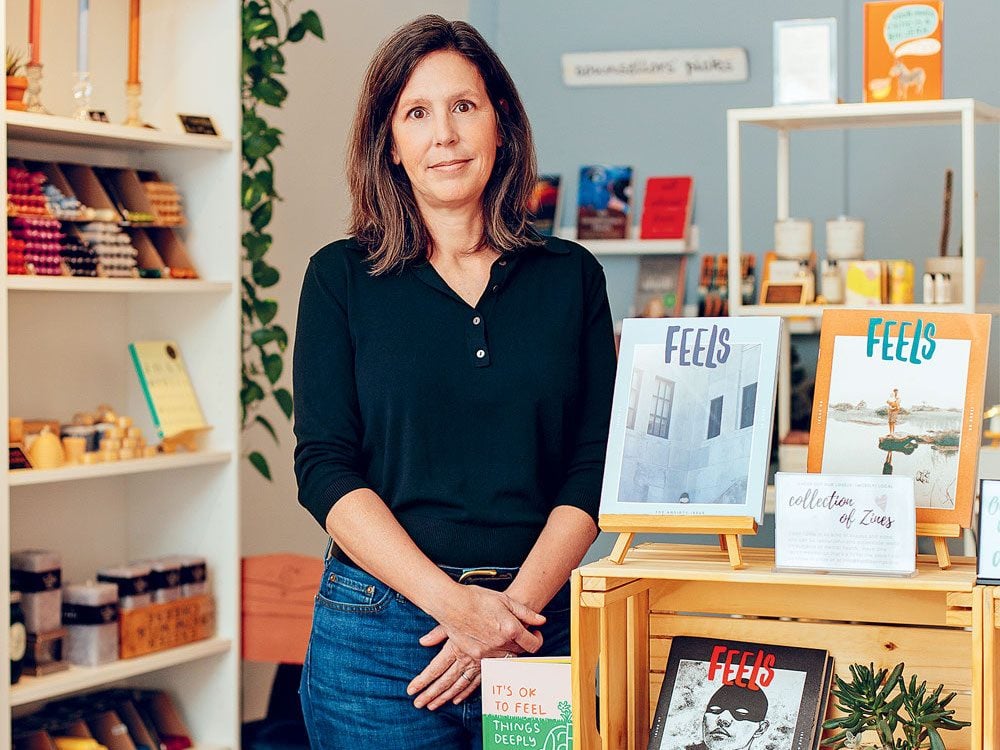How One Toronto Storefront Provides Accessible and Affordable Therapy
Kate Scowen founded Hard Feelings to provide quality mental health care for some of Canada's most vulnerable populations.

Talk shop
From the street, Hard Feelings looks more like an independent bookstore than a mental health centre. Shelves are lined with books on trauma, gender and sexuality, parenting and more. You can buy candles, notebooks, teas and mugs. But past the cheery receptionist wait three rooms reserved for counselling sessions.
Kate Scowen opened Hard Feelings in Toronto in 2017. Therapy in Canada can be prohibitively expensive for low-income and gig economy workers and anyone else without workplace benefits. Scowen wanted to fill the gap by making a difference, not a profit.
Scowen wasn’t new to helping others. Over almost 30 years, she held various jobs assisting marginalized youth, and taught English to community work students at Toronto’s George Brown College. At age 49, after a lifetime of practical experience, she enrolled in the graduate social work program at the University of Toronto. It was during her studies that she landed on a plan to open her own counselling centre.
According to recent reports from Statistics Canada, more than five million Canadians reported needing mental health care, but nearly half of that group said their needs were either unmet or only partially met. Often, people go without because they can’t afford care or don’t know where to get it. That is where the Hard Feelings model—a storefront anyone can access—fits in. “I wanted to develop something based on my ideal of how mental health supports could be offered,” says Scowen, “and that is with community, warmth and innovation.”
Scowen recruited nearly 30 counsellors who treat a wide range of mental health issues, including anxiety, depression, substance abuse and anger management. In its first year, the clinic served 342 clients. Last year, that number jumped to 424. Clients are charged between $50 and $80 per session; the exact fee is decided during the first meeting and based on ability to pay. In comparison, therapists elsewhere in Toronto often charge up to $125 per session, putting help beyond reach for many people.
The emphasis is on short-term counselling—a max of 12 sessions. Scowen says this guarantees more people can access their services. (If longer term treatment is required, a client and counsellor may agree to continue at the counsellor’s private practice.) The point, though, is to tear down barriers to mental health care. Her counsellors all happily accept lower hourly rates just to be involved, and dozens have joined a waiting list to offer therapy at the centre.
While clients come from all over the city, many live or work in the neighbourhood, which is one of the city’s most economically and ethnically diverse. Some walk in off the street, attracted by the friendly window displays and curious to learn more. With the spread of COVID-19, clients have also wanted to talk about challenges with stress, often because of job loss. Many are freelancers, gig workers or retail staff who were laid off or saw their income sources dry up during the outbreak.
Many clients also feel like they’ve found something special. When Max Mertens, a 29-year-old freelance journalist, was laid off in early summer 2018, he was wracked with anxiety. He recognized he needed counselling but also knew he was unable to afford it. Then he discovered Hard Feelings. “It really helped,” he says, “to have a place to vent for an hour.” After his 12 sessions were finished, Mertens continued seeing his therapist. Hard Feelings is an amazing place, he says. He only wishes there were more like it.
Next, learn about the bootcamp that helps retired seniors launch new businesses.



